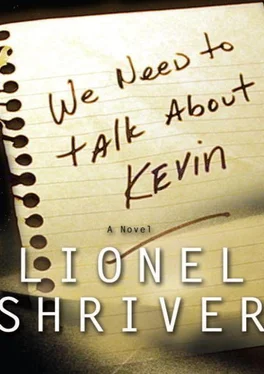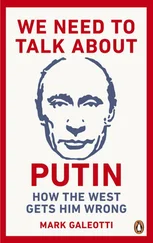“In a pig’s eye!” you cried fraternally.
“Teenage Mutant Ninja Turtles? Spiderman? Action figures are dolls .”
“Great, Eva,” you muttered. “Give the little guy a complex.”
Meantime, Kevin had sidled closer to the bed and dipped his hand into the glass of water on the bedside table. Eyeing the baby askance, he held his wet hand over her face and let drops of water drip, drip onto her face. Celia twisted, disconcerted, but the baptism didn’t seem to be upsetting her, though I would later learn to regard the fact that my daughter hadn’t complained or cried out as meaningless. His face stirring with a rare if clinical curiosity, Kevin wet his hand again and spattered his sister’s nose and mouth. I wasn’t sure what to do. Kevin’s christening reminded me of fairy tales in which an aggrieved relative arrives to curse the princess in her crib. Yet he wasn’t really hurting her, and I didn’t want to taint this introduction with a reprimand. So when he dipped his hand a third time, I resettled myself on the pillow and, dabbing her face with the sheet, discreetly withdrew the baby out of his reach.
“Hey, Kev!” You rubbed your hands. “Your mother has to get dressed, so let’s go find something really greasy and really salty in those machines down the hall!”
When we left the hospital together, you said I must be shot after being up and down all night with a newborn and volunteered to baby-sit while I got some sleep.
“No, it’s the oddest thing,” I whispered. “I did get up a couple of times for feeding, but I had to set an alarm. Franklin—she doesn’t cry.”
“Huh. Well, don’t expect that to last.”
“You never know—they’re all different.”
“Babies ought to cry,” you said vigorously. “Kid just lolls in bed and sleeps all day, you’re raising a doormat.”
When we came home, I noticed that the framed photo of me in my late twenties that we kept on the little table in the foyer was missing, and I asked you if you’d moved it. You said no, shrugging, and I declined to pursue the matter, assuming it would turn up. It didn’t. I was a little perturbed; I no longer looked nearly that pretty, and these verifications that we were once lineless and lovely do grow precious. The shot had been snapped on an Amsterdam houseboat with whose captain I had a brief, uncomplicated affair. I treasured the expression he’d captured—expansive, relaxed, warm; it fixed a simple glorying in all that I then required of life: light on water, bright white wine, a handsome man. The portrait had softened the severity that marked most of my pictures, with that shelved brow of mine, my deep-set eyes in shadow. The houseboat captain had mailed me the photo, and I didn’t have the negative. Oh, well. Presumably, while I was in the hospital Kevin had snatched the print to poke pins in.
Anyway, I was in no mood to get exercised over one silly snapshot. In fact, though I fear that my martial metaphor may seem provocative, when I carried Celia over our threshold I had the exhilarating impression of having reset our troop strengths at a healthy par. Little could I know that, as a military ally, a trusting young girl is worse than nothing, an open left flank.
Eva
Dear Franklin,
You know, I was just thinking that I might have been able to handle everything— Thursday , the trials, even our separation—if only I’d been allowed to keep Celia. Nevertheless (and this may surprise you), I like picturing her with you, imagining the two of you together. I’m glad if, at last, you may be getting to know one another better. You were a good father to her—I don’t mean to criticize—but you were always so sensitive about slighting Kevin that you may have overdone it, the reassurance that you were still on his side. You kept her a little at arm’s length. And as she got older, she got so pretty, didn’t she? In a tentative, bashful way, with that fine gold hair fluttering forever in her face. I think you resented it, on Kevin’s behalf—how other people found her so enchanting, whereas with Kevin they tended to be wary and so overly hearty or false and sometimes visibly relieved when we showed up at their house and hadn’t brought him along. It wasn’t fair, you thought. I suppose, in that big universal way, it wasn’t.
Maybe my love for Celia was too easy. Maybe in my own terms she was a kind of cheating, since my whole life I had striven to surmount difficulty, to overcome terrors. Celia was plainly lovable. I can’t recall anyone who didn’t find her sweet, though I wonder if she stuck in the mind. Neighbors rarely liked Kevin, even if they were too polite to say so outright, but they remembered him. Both our families copped attitudes. Your sister Valerie was always edgy about leaving Kevin unattended anywhere in her fastidiously decorated house and, just to check up on him, kept bringing our son sandwiches he didn’t want; whenever he picked up a candy dish or fiddled with the tassel of a tieback, she’d jump up and take it away. Well before Kevin’s deficiencies became national news, whenever Giles asked after our son my brother seemed to be fishing for mean little stories to confirm a private prejudice. Kevin was hard to like, much less to love, but in this way he should have been perfectly fashioned for the likes of his mother. Kevin was hard to love in the same manner that it was hard to eat well in Moscow, find a cheap place to stay in London, or locate a commercial Laundromat in Bangkok. But I had moved back to the United States, grown soft. As I would sometimes cave to expedience and order takeout curries with a side of naan instead of simmering chicken in turmeric for hours on my stove, I chose the easy comfort of a compliant, ready-made child rather than break down the stringy fibers of a tough kid with long low heat. I had been rising to challenges for most of my life. I was tired, and, latterly, flabby; in a spiritual sense, I was out of shape.
But it is only natural for the current of emotion to follow the path of least resistance. To my amazement, when I put Celia down she slept; I guess we were indeed raising “a doormat.” Whereas Kevin had screeched with every conceivable need met, Celia would submit to all manner of material deprivations with barely a mewl or stir, and she could pickle for hours in a wet diaper unless I remembered to check. She never wept out of hunger yet always took the breast, so I was obliged to feed her according to a fixed schedule. I may have been the first mother in history to despair that her baby didn’t cry enough.
Kevin’s disconsolate infancy had segued to wholesale boredom; Celia was entranced by the least bauble. Every bit as delighted with a scrap of colored tissue paper as with that expensive mother-of-pearl mobile over her crib, she displayed an indiscriminate fascination with the tactile universe that would have driven your Madison Avenue masters to distraction. Ironically for a girl so easy to please, it would grow difficult to buy her presents because she was so infatuated with the toys she had. As she got older she formed such passionate loyalties to tattered stuffed animals that the gift of plush, fresh-furred creatures seemed to throw her into turmoil—as if, like her second-time father, she feared that to enlarge her little family was to imperil previous, more primitive commitments. The newer animals were only allowed in her bedtime embrace once they had proved themselves by losing an ear or had joined the fallible, mortal world with a baptismal stain of strained broccoli. Once she could speak, she confided to me that she was careful to play with each member of the menagerie every day, lest one feel neglected or jealous. Her favorite, most fiercely defended toys were the ones that (thanks to Kevin) were broken.
Читать дальше












